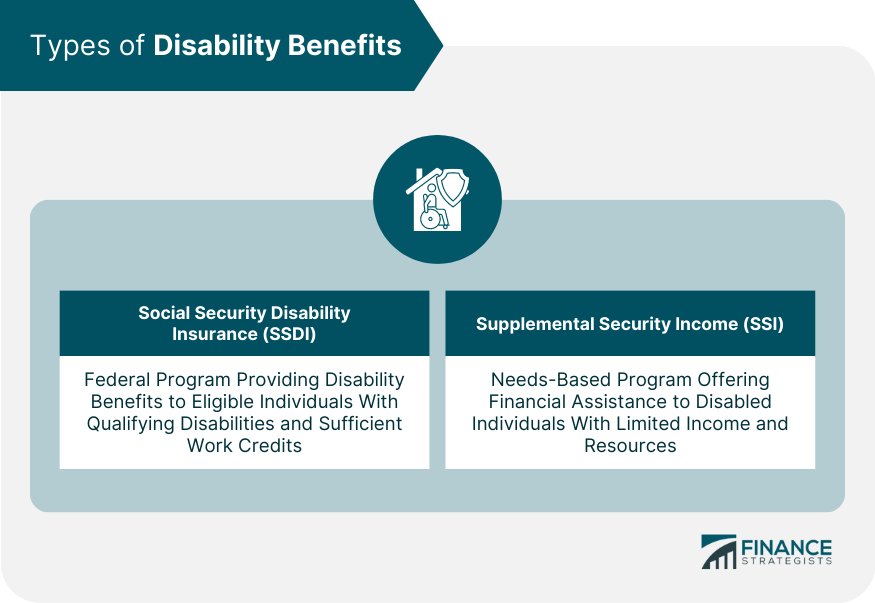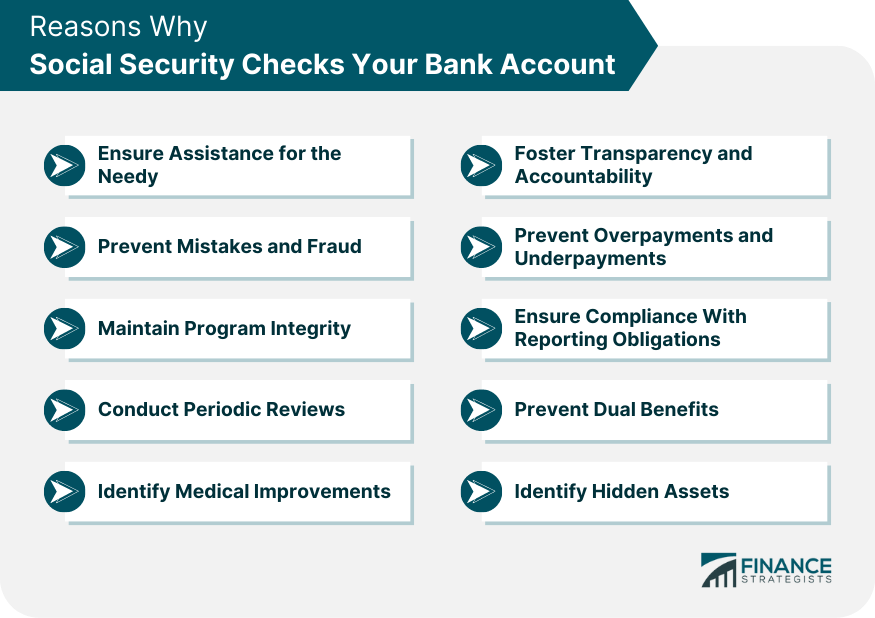Yes, Social Security can check your bank account under certain circumstances. The Social Security Administration (SSA) has the authority to access certain financial records, including bank account information, to verify eligibility and ensure program integrity. The primary reasons for Social Security to check bank accounts include means testing, which ensures that benefits are targeted to those with genuine financial need, and preventing overpayments and fraudulent claims. The SSA conducts periodic reviews, such as continuing disability reviews (CDRs) for disability beneficiaries, to ensure ongoing eligibility for benefits. While the SSA has the authority to access bank accounts, they also have safeguards in place to protect individuals' privacy and ensure fair and appropriate benefits distribution. Staying informed about the process, using available resources, and adhering to reporting requirements can help individuals navigate their financial affairs responsibly and maintain their eligibility for Social Security benefits. When it comes to disability benefits offered by the SSA, the two main programs that may involve checking the bank account are Social Security Disability Insurance (SSDI) and Supplemental Security Income (SSI). SSDI is a federal program that provides disability benefits to eligible individuals who have a qualifying disability and have accumulated enough work credits through their employment history. SSDI recipients might be subject to bank account checks during the application process and during CDRs. CDRs are periodic reviews conducted by the SSA to ensure that the disability still exists and that the individual meets the eligibility requirements for continued benefits. SSI is a needs-based program designed to provide financial assistance to disabled individuals who have limited income and resources. SSI recipients' bank accounts may be subject to checks during the application process and as part of ongoing financial eligibility reviews. Since SSI is a means-tested program, the SSA needs to verify the individual's financial situation regularly to ensure they continue to meet the financial eligibility criteria. Here are the reasons why Social Security checks your bank account: The primary and fundamental reason for the SSA to conduct bank account checks is to ensure that disability benefits reach individuals who genuinely need financial assistance due to a qualifying disability. By carefully examining bank account information, the SSA can determine whether the applicant or beneficiary meets the necessary criteria for receiving disability benefits. Thorough financial assessments play a crucial role in identifying inaccuracies or discrepancies in the information provided by applicants. By cross-referencing bank account records with the reported financial details, the SSA can prevent incorrect payments and safeguard taxpayer funds. Detecting errors or misrepresentations ensures that benefits are accurately disbursed, protecting both the integrity of the Social Security system and the financial interests of the public. By implementing measures to verify financial eligibility, the SSA demonstrates a commitment to fairness and responsible governance. This commitment, in turn, builds public trust and confidence in the benefits program, assuring individuals that the system operates justly and transparently. The SSA conducts CDRs to assess ongoing eligibility for disability benefits. These periodic reviews ensure that the assistance provided aligns with the individual's current medical condition and disability status. Bank account checks may reveal improvements in an individual's medical condition that could impact their eligibility for disability benefits. As medical conditions can change over time, reviewing bank account records alongside medical documentation allows the SSA to reassess the individual's disability status and adjust benefits accordingly. The practice of bank account checks contributes to a fair and equitable system, promoting transparency and accountability within the Social Security disability benefits program. By subjecting financial eligibility to scrutiny, the SSA ensures that benefits are distributed fairly and that all beneficiaries adhere to program requirements. By scrutinizing bank account transactions, the SSA can identify instances of overpayments or underpayments. Regular reviews of financial records enable the SSA to adjust benefit amounts promptly based on changes in the beneficiary's financial situation, ensuring accurate and timely payments. Bank account checks serve as a means to verify that beneficiaries are compliant with their reporting obligations. The SSA requires individuals receiving disability benefits to promptly report any changes in their financial status. Social Security ensures that individuals do not receive dual benefits that overlap or duplicate assistance from different programs. By cross-referencing bank account information, the SSA can identify any potential overlap and take necessary steps to prevent duplicate payments. Some individuals may attempt to hide assets or financial resources to qualify for benefits fraudulently. By thoroughly examining bank account records, the SSA can identify hidden assets, ensuring that benefits are allocated to those who genuinely meet the eligibility requirements. The frequency of SSA checking your bank account is not standardized, and there is no predetermined schedule or guaranteed timeline for monitoring. It can vary from once a year, to twice a year, to even less frequent, depending on individual circumstances and the SSA's review schedule. The SSA employs an electronic system to verify bank account balances and ensure that beneficiaries continue to meet eligibility requirements. While the SSA has the authority to check bank accounts under certain circumstances, individuals are protected by strict privacy laws that safeguard their sensitive financial data. The SSA's access to financial information is limited to verifying eligibility and preventing fraud, ensuring beneficiaries' privacy rights are upheld. Beneficiaries also have the right to appeal any decisions resulting from bank account checks, offering a recourse for challenging erroneous determinations. For means-tested programs like SSI, regular verification of financial resources through bank account checks ensures fair allocation of limited funds to those who meet the eligibility criteria. Legal representation is available for beneficiaries facing challenges, providing valuable guidance and support. Periodic reviews, such as CDRs, help maintain an accurate benefits program, ensuring assistance reaches those who genuinely need it. The SSA aims to balance the necessity of accessing financial information with robust protections to uphold the integrity of the Social Security system and support deserving individuals in their financial journey. The frequency of Social Security checking your bank account is not standardized, and it can vary based on individual circumstances and the SSA's review schedule. The primary reasons for these bank account checks are to ensure assistance reaches the needy, prevent mistakes and fraud, and maintain program integrity. Conducting periodic reviews allows the SSA to assess ongoing eligibility and identify medical improvements that may affect disability benefits. While Social Security has the authority to access bank accounts, they have safeguards in place to protect privacy and ensure fair distribution of benefits. It is essential for individuals to stay informed about the process, adhere to reporting requirements, and use available resources to navigate their financial affairs responsibly and maintain their eligibility for Social Security benefits. Can Social Security Check Your Bank Account?
Types of Disability Benefits
Social Security Disability Insurance (SSDI)
Supplemental Security Income (SSI)

Reasons Why Social Security Checks Your Bank Account
Ensuring Assistance for the Needy
Preventing Mistakes and Fraud
Maintaining Program Integrity
Conducting Periodic Reviews
Identifying Medical Improvements
Fostering Transparency and Accountability
Preventing Overpayments and Underpayments
Ensuring Compliance With Reporting Obligations
Preventing Dual Benefits
Identifying Hidden Assets

How Often Will Social Security Check Your Bank Account
Protections and Limitations
Conclusion
Can Social Security Check Your Bank Account? FAQs
Yes, under specific circumstances, Social Security has the authority to check your bank account without requiring your consent. These checks are conducted to verify eligibility for benefits and prevent fraudulent activities.
The frequency of bank account checks by Social Security is not standardized and varies based on individual circumstances. It can occur once a year, twice a year, or even less frequently, depending on the SSA's review schedule and the type of benefits you receive.
During bank account checks, the SSA can access certain financial information, such as your account balances and transactions. However, their access is limited to specific purposes related to benefit verification and program integrity.
Bank account checks are conducted to ensure the accurate distribution of benefits and prevent fraudulent claims. If discrepancies or changes in financial status are detected, it may impact your benefit amount or ongoing eligibility.
Yes, if Social Security makes a decision based on a bank account check that you believe to be erroneous or unfair, you have the right to appeal. The appeals process allows you to challenge the decision and seek resolution for your specific situation.
True Tamplin is a published author, public speaker, CEO of UpDigital, and founder of Finance Strategists.
True is a Certified Educator in Personal Finance (CEPF®), author of The Handy Financial Ratios Guide, a member of the Society for Advancing Business Editing and Writing, contributes to his financial education site, Finance Strategists, and has spoken to various financial communities such as the CFA Institute, as well as university students like his Alma mater, Biola University, where he received a bachelor of science in business and data analytics.
To learn more about True, visit his personal website or view his author profiles on Amazon, Nasdaq and Forbes.











